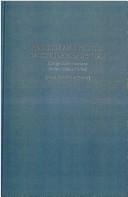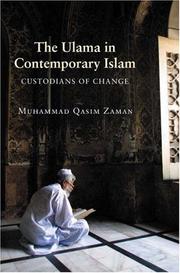| Listing 1 - 10 of 23 | << page >> |
Sort by
|
Multi
ISBN: 9781316227145 9781107106666 9781107514379 1316227146 1107106664 1107514371 1108506089 1108513530 1108515029 1108516513 110852396X 9781108523967 9781108506083 9781108513531 9781108515023 9781108516518 Year: 2017 Publisher: Cambridge Cambridge University Press
Abstract | Keywords | Export | Availability | Bookmark
 Loading...
Loading...Choose an application
- Reference Manager
- EndNote
- RefWorks (Direct export to RefWorks)
Muslim scholars are a vital part of Islam, and are sometimes considered 'heirs to the prophets', continuing Muhammad's work of establishing Islam in the centuries after his death. But this was not always the case: indeed, Muslims survived the turmoil of their first century largely without the help of scholars. In this book, Jonathan Brockopp seeks to determine the nature of Muslim scholarly communities and to account for their emergence from the very beginning of the Muslim story until the mid-tenth century. By analysing coins, papyri and Arabic literary manuscripts from the ancient mosque-library of Kairouan, Tunisia, Brockopp offers a new interpretation of Muslim scholars' rise to positions of power and influence, serving as moral guides and the chief arbiters of Muslim tradition. This book will be of great benefit to scholars of comparative religion and advanced students in Middle Eastern history, Islamic Studies, Islamic Law and early Islamic literature.
Learning and scholarship --- Learning and scholarship. --- Muslim scholars. --- Ulama --- Ulama. --- History --- History. --- Islamic Empire. --- Muslim scholars --- HISTORY / Middle East / General.
Book
ISBN: 2909194051 2909194531 2821862180 Year: 2015 Publisher: Sanaa : Centre français de recherche de la péninsule Arabique,
Abstract | Keywords | Export | Availability | Bookmark
 Loading...
Loading...Choose an application
- Reference Manager
- EndNote
- RefWorks (Direct export to RefWorks)
Tout au long de la longue histoire du Yémen islamique, les savants ont trouvé en certaines localités, parfois désignées sous le nom de Hiğra, un lieu privilégié pour la transmission de leurs savoirs. Le présent texte, traduit de l'arabe, constitue l'introduction générale à la vaste encyclopédie en cinq volumes que le cadi Ismā‘īl b. ‘Alī al-Akwa‘ leur a consacrés. During the long history of Islamic Yemen, scholars have found in certain places, sometimes called Hiğra, a favorable environment for teaching and learning. This book, translated from arabic, is the general introduction to the five-volumes encyclopaedia that has been devoted to theses "refuges of learning" by the late Yemeni scholar Cadi Ismā‘īl b. ‘Alī al-Akwa‘.
Book
ISBN: 9789004270312 9789004291942 9004291946 9004270310 1336207264 Year: 2015 Publisher: Boston
Abstract | Keywords | Export | Availability | Bookmark
 Loading...
Loading...Choose an application
- Reference Manager
- EndNote
- RefWorks (Direct export to RefWorks)
Chanfi Ahmed shows how West African ʿulamāʾ, who fled the European colonization of their region to settle in Mecca and Medina, helped the regime of King Ibn Sa’ud at its beginnings in the field of teaching and spreading the Salafῑ-Wahhabῑ’s Islam both inside and outside Saudi Arabia. This is against the widespread idea of considering the spread of the Salafῑ-Wahhābῑ doctrine as being the work of ʿulamāʾ from Najd (Central Arabia) only. We learn here that the diffusion of this doctrine after 1926 was much more the work of ʿulamāʾ from other parts of the Muslim World who had already acquired this doctrine and spread it in their countries by teaching and publishing books related to it. In addition Chanfi Ahmed demonstrates that concerning Islamic reform and mission (daʿwa), Africans are not just consumers, but also thinkers and designers.
Salafīyah --- Ulama --- Salafiyya --- Ulémas --- Ulema --- Islam --- Muslim scholars --- Islamic sects --- Functionaries

ISBN: 0585090556 9780585090559 0873954084 9780873954082 0791494411 Year: 1980 Publisher: Albany State University of New York Press
Abstract | Keywords | Export | Availability | Bookmark
 Loading...
Loading...Choose an application
- Reference Manager
- EndNote
- RefWorks (Direct export to RefWorks)
Islam and politics --- Ulama --- Religion --- Philosophy & Religion --- Islam --- Ulema --- Muslim scholars --- Functionaries --- Iran --- Politics and government
Book
ISBN: 1607819775 9781607819776 9781607810322 1607810328 Year: 2010 Publisher: Salt Lake City University of Utah Press
Abstract | Keywords | Export | Availability | Bookmark
 Loading...
Loading...Choose an application
- Reference Manager
- EndNote
- RefWorks (Direct export to RefWorks)
Islam --- Ulama --- Ulema --- Muslim scholars --- History. --- Functionaries --- Egypt --- Politics and government.
Book
ISBN: 1282399594 9786612399596 9047442938 9789047442936 9789004169531 9004169539 Year: 2009 Publisher: Leiden Boston Brill
Abstract | Keywords | Export | Availability | Bookmark
 Loading...
Loading...Choose an application
- Reference Manager
- EndNote
- RefWorks (Direct export to RefWorks)
This collective volume provides an integrative historical and contemporary discussion of Sunni ʿulamaʾ in the Middle East in both an urban and a semi-tribal context. The various chapters reinforce a renewed interest in the position of the ʿulamaʾ in modern times and offer new insights as to their ideological vitality and contribution to the public discourse on moral and sociopolitical issues.
Islam. --- Ulema. --- Islam --- Ulama. --- Ulema --- Muslim scholars --- History. --- Functionaries --- Ulémas --- Histoire
Book
ISBN: 0804777764 9780804777766 9780804773119 0804773114 Year: 2011 Publisher: Stanford, Calif. Stanford University Press
Abstract | Keywords | Export | Availability | Bookmark
 Loading...
Loading...Choose an application
- Reference Manager
- EndNote
- RefWorks (Direct export to RefWorks)
To better understand the diverse inheritance of Islamic movements in present-day Turkey, we must take a closer look at the religious establishment, the ulema, during the first half of the twentieth century. During the closing years of the Ottoman Empire and the early decades of the Republic of Turkey, the spread of secularist and anti-religious ideas had a major impact on the views and political leanings of the ulema. This book explores the intellectual debates and political movements of the religious establishment during this time.Bein reveals how competing visions of development
Ulama --- Islam --- Muslim scholars --- Islam and state --- Secularism --- History --- Functionaries --- Turkey --- Religious aspects.
Book
ISBN: 9048531624 9789048531622 9789462981850 946298185X Year: 2018 Publisher: Amsterdam : Amsterdam University Press,
Abstract | Keywords | Export | Availability | Bookmark
 Loading...
Loading...Choose an application
- Reference Manager
- EndNote
- RefWorks (Direct export to RefWorks)
This book looks at fatwa in Indonesia during the period following the fall of President Suharto. It is an in-depth exploration of three fatwa-making agencies-Majelis Ulama Indonesia, Lajnah Bahth al-Masail Nahdlatul Ulama, and Majelis Tarjih Muhammadiyah-all of which are highly influential in shaping religious thought and the lives of Muslims in Indonesia. Rather than look at all the fatwa that have emerged in the period, Pradana Boy ZTF focuses on those that have strong repercussions for intra-community relations and the development of Indonesian Muslims more generally, including fatwa pertaining to sectarianism, pluralism, secularism and liberalism.
Fatwas --- Ulama --- Ulema --- Islam --- Muslim scholars --- Fatāwá --- Advisory opinions (Islamic law) --- Islamic law --- Functionaries --- Law and legislation --- Sources --- Fatwa, Islamic Legal Thought, Majelis Ulama Indonesia, Majelis Tarjih, Bahth al-Masail, Islamic Law.

ISBN: 1282964682 9786612964688 1400837510 9781400837519 0691096805 9780691096803 9780691130705 0691130701 9781282964686 6612964685 Year: 2002 Publisher: Princeton: Princeton university press,
Abstract | Keywords | Export | Availability | Bookmark
 Loading...
Loading...Choose an application
- Reference Manager
- EndNote
- RefWorks (Direct export to RefWorks)
From the cleric-led Iranian revolution to the rise of the Taliban in Afghanistan, many people have been surprised by what they see as the modern reemergence of an antimodern phenomenon. This book helps account for the increasingly visible public role of traditionally educated Muslim religious scholars (the `ulama) across contemporary Muslim societies. Muhammad Qasim Zaman describes the transformations the centuries-old culture and tradition of the `ulama have undergone in the modern era--transformations that underlie the new religious and political activism of these scholars. In doing so, it provides a new foundation for the comparative study of Islam, politics, and religious change in the contemporary world. While focusing primarily on Pakistan, Zaman takes a broad approach that considers the Taliban and the `ulama of Iran, Egypt, Saudi Arabia, India, and the southern Philippines. He shows how their religious and political discourses have evolved in often unexpected but mutually reinforcing ways to redefine and enlarge the roles the `ulama play in society. Their discourses are informed by a longstanding religious tradition, of which they see themselves as the custodians. But these discourses are equally shaped by--and contribute in significant ways to--contemporary debates in the Muslim public sphere. This book offers the first sustained comparative perspective on the `ulama and their increasingly crucial religious and political activism. It shows how issues of religious authority are debated in contemporary Islam, how Islamic law and tradition are continuously negotiated in a rapidly changing world, and how the `ulama both react to and shape larger Islamic social trends. Introducing previously unexamined facets of religious and political thought in modern Islam, it clarifies the complex processes of religious change unfolding in the contemporary Muslim world and goes a long way toward explaining their vast social and political ramifications.
Muslim scholars. --- Ulama. --- Islamic scholars --- Scholars, Muslim --- Scholars --- Ulema --- Islam --- Muslim scholars --- Functionaries --- Ulama --- #SBIB:316.331H421 --- #SBIB:39A10 --- Morfologie van de godsdiensten: Islam --- Antropologie: religie, riten, magie, hekserij --- Islam and politics. --- Ulémas --- Islam et politique --- Political sociology --- Middle East
Book
ISBN: 9048532906 9789048532902 9789462982932 9462982937 Year: 2018 Publisher: Amsterdam : Amsterdam University Press
Abstract | Keywords | Export | Availability | Bookmark
 Loading...
Loading...Choose an application
- Reference Manager
- EndNote
- RefWorks (Direct export to RefWorks)
The Suharto (1966-98) government of Indonesia and the Mahathir (1981-2003) government of Malaysia both launched Islamisation programmes, upgrading and creating religious institutions. The author argues that, while generally ulamas, or religious teachers, had to support state ideologies, they sometimes succeeded in ŸcapturingŒ the state by influencing policies in their favour. The author builds his argument on strong fieldwork data, especially interviews, and he engages in critical discussion of comparative politics paradigms and the concept of capture.
POLITICAL SCIENCE / General. --- Malaysia --- Indonesia --- Endonèsie --- Indanezii︠a︡ --- Indoneshia --- Indoneshia Kyōwakoku --- Indonesië --- Indonesya --- Indonezia --- Indonezii︠a︡ --- Indonezija --- İndoneziya --- İndoneziya Respublikası --- Indūnīsīyā --- Induonezėjė --- Jumhūrīyah Indūnīsīyā --- PDRI (Pemerintah Darurat Republik Indonesia) --- Pemerintah Darurat Republik Indonesia --- R.I. (Republik Indonesia) --- Republic of Indonesia --- Republic of the United States of Indonesia --- Republica d'Indonesia --- Republiek van Indonesië --- Republik Indonesia --- Republik Indonesia Serikat --- Republika Indonezii︠a︡ --- Republika Indonezija --- Rėspublika Indanezii︠a︡ --- RI (Republik Indonesia) --- United States of Indonesia --- Yinni --- Рэспубліка Інданезія --- Република Индонезия --- Индонезия --- Інданезія --- إندونيسيا --- جمهورية إندونيسيا --- インドネシア --- インドネシア共和国 --- Dutch East Indies --- History --- Religious life and customs --- Islam --- Ulama --- Mohammedanism --- Muhammadanism --- Muslimism --- Mussulmanism --- Religions --- Muslims --- Ulema --- Muslim scholars --- Functionaries --- Majelis Ulama Indonesia. --- MUI --- Indonesian Ulama Council --- Indonesian Council of Ulama --- Majelis Ulama Seluruh Indonesia --- Council of Indonesian ʻUlamāʼ --- Council of Indonesia ʻUlamāʼ --- Majlis Ulama Indonesia --- Indonesian Ulema Council --- Indonesian Ulemas Council --- Indonesia Ulemas Council --- Ulama in Indonesia and Malaysia, state capture, co-optation, Islamic revivalism.
| Listing 1 - 10 of 23 | << page >> |
Sort by
|

 Search
Search Feedback
Feedback About UniCat
About UniCat  Help
Help News
News